Understanding Booking.com fees
Booking.com fees for hosts are amongst the most complicated to understand. Considering that every rental website has a different fee structure, understanding how pricing works on each one can be a bit of a headache for any vacation rental manager.
With variation in fees depending on location, property type, cancellation policy and more, it can be a challenge to get your head around the different permutations of Booking.com fees. Yet, Booking.com fees should not deter you from listing your property there, since it is one of the biggest OTAs, with more than 6 million listings and 100 million visitors per month.
What is the Booking.com fee for hosts (booking partners)?
Fees for property hosts on Booking.com
For property hosts, the Booking.com app uses a commission based platform to charge fees. This basically means that the host pays a certain percentage of the reservation everytime a reservation is made through the Booking.com app or webpage.
These percentages vary from anywhere between 10% and 20% (sometimes 25%) depending on the:
- Country of registration
- Listing location
- Property type
- Cancellation policy
- Payout method
While the property location and cancellation policy are the major factors affecting the Booking.com fees, it’s good to know that fees may vary if you rent out an apartment or villa.
Additionally, the cost of Payments by Booking.com, a payment solution that handles all transactions for hosts and their guests, varies based on the location of the property. The bank processing fees range from 1.1% to 3.1% depending on the country.
Hotel fees on Booking.com
The hotel base fee also stands at 15%, and this can also rise to a 18% commission charge, if the host prefers to use the member service that Booking.com recommends.
As you can see, Booking.com fees can vary a lot depending on how you set up your account and what the guest chooses when they book, so if you do want to list with them directly you need to be quite thorough in your research.
It is worth noting that the host fee on Booking.com is not affected by whether you’re a ‘private host’ or a ‘professional host’ (definitions from the EU law).
Is the commission charged by Booking.com right?
To make sure you’re charged the right amount of commission, it’s important that all your reservations are correctly registered in the (somewhat fiddly) Booking.com extranet. Do not forget to:
- mark no-shows,
- modify dates,
- update prices.
If you need to make any changes you’ve got a limited window in which to do this, and it has to be done through the extranet otherwise you might find you get slapped with a higher commission than you were expecting.
Simplify property management on Booking.com
If you’re looking to simplify your property management, listing your property on multiple sites via Your Rentals will help keep things simple by using straightforward pricing no matter what platform you connect to.
With the super-easy to use listings builder, and the added advantage of expert feedback to allow you to gauge the quality of your listing, you’ll soon be advertised with a professional look on as many sites as you want with a simple pricing structure.
Easy way to start Airbnb business
Your.Rentals is here to assist you build great vacation rental listings on 30+ channels.

Of course, you might already be working with a channel directly. It is important to make an informed decision as to which short term rental sites you would like to work with, and which would be better connected via a channel manager.
To accomplish this you should have a basic understanding of what the different OTAs will charge you for advertising your holiday property with them directly. Let’s look and see exactly how things work with Booking.com fees.
Booking.com Cancellation Fees
There are a few things to bear in mind if you choose to list with Booking.com.
How to set up a cancellation policy
Many property managers understandably prefer to offer non-refundable bookings. However, when booking through Booking.com, it’s important to be aware that in the event guests do not stay at your property, for any reason, you, as the host, will still be charged the commission rate as part of the Booking.com fees.
There is, however, a loophole at the time of writing. If you are unable to charge a no-show guest then you’re able to waive their fee when marking them as a no-show in the extranet. This means you won’t be accidentally charged commission on that booking.
Marking guests as no-show in the Extranet
To do this:
- Go to Extranet > Reservations.
- Find the guest’s reservation number and open the reservation details page.
- Click the button “Mark as No-Show” from the list.
- Both you and your guest will receive confirmation emails that the reservation has been cancelled due to a no-show status.
Make sure you report any no-shows in time: the button is only available within midnight of the check-in date until 48 hours after the planned check-out date.
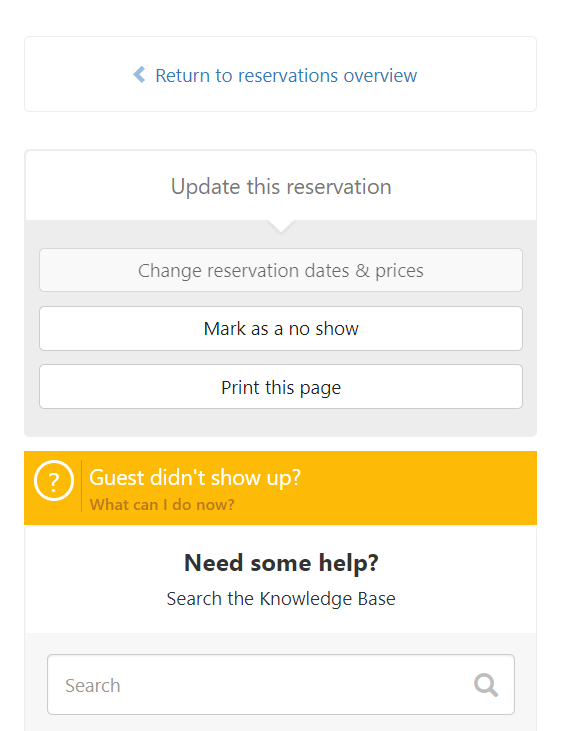
Reduce cancelation fees by marking No-Show gests in time on Booking.com extranet
After the coronavirus outbreak
Many travellers were hesitant to book holiday rentals since the travel restrictions were very unstable. It is well known that the short-term rental industry is highly affected by force-majeure events like the coronavirus.
But there is a way to save your bookings. The latest trends show that properties with flexible cancellation policies have a lot more chances to get bookings. If we look at the data, we can see that 80% of all new bookings had fully refundable cancellation policies.

Up to 80% of bookings in 2021 had fully refundable cancellation policies (own data of Your.Rentals)
Booking.com cleaning fees and security deposit
When a guest books through Booking.com, both the rental fee and the cleaning fee are deducted upfront. The host will then receive the full amount, with the commission rate deducted.
If you want to set up a cleaning fee or security deposit on Booking.com, you can do that by selecting Policies under the Property tab.
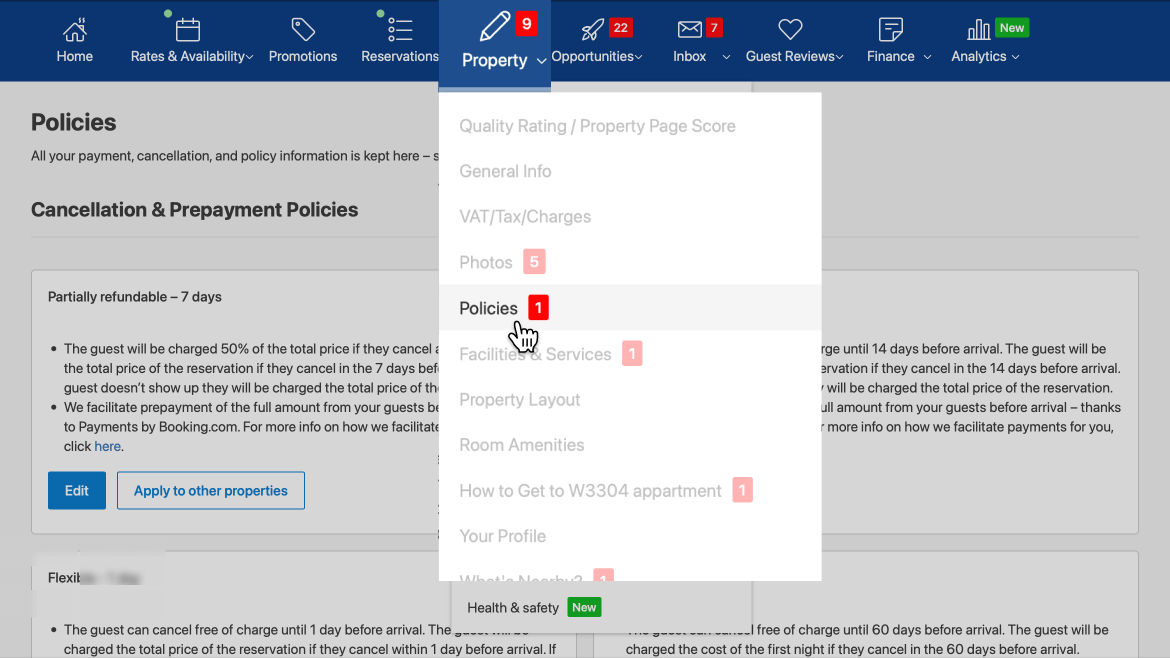
How do booking.com hosts get paid?
Booking.com accepts various forms of payments. Booking.com allows guests to either pay through Booking.com or pay at the property directly. Also, there are online and offline payment methods to choose from.
Online payment methods:
- Credit, debit, and prepaid cards from Visa, Mastercard, American Express, China UnionPay, Discover, Diners, JCB, and Carte Bancaire
- PayPal
- ApplePay, GooglePay, and AliPay
- WeChat, iDeal, and Sofort.
- Klarna, Paypal Credit
Cardless payment options:
- Paypal
- Sofort
Pay on site:
- By credit/debit card
- Cash feature
If you want to learn more about the specific payment options from the host’s perspective, check out our article on Booking.com payment options.
Avoid Booking.com reservation fees through Direct Booking
When listing your properties on Booking.com you expose your listings to a very large number of potential guests. Although there is the alternative of getting direct bookings through your business website, Facebook or over the phone.
This allows property managers to receive direct bookings and dodge the fees from big platforms like Booking.com or Airbnb.
The process is very easy, you just need to install a plugin on your business website and guests will be able to book directly from your site, and it will be synchronised with Your.Rentals calendar with all the different platforms.
In case that your vacation rental business doesn’t have a website yet, Your.Rentals offer the option to create your own site where you can receive bookings and display all the information needed.
Get yourself a bookable website
Get started with Your.Rentals and order a free-to-create website for direct bookings.

Keeping Booking.com fees and everything else under control
Unlike some of the other big online reservation services available, Booking.com is an agency model that is not used as a contracting party, which means you are responsible for controlling when your property is available and the rates you wish to charge your guests.
If you’re juggling multiple listings on different accounts on different websites, this can soon get pretty complicated. However, as we have already highlighted earlier in this article, the best way to stay in control is to use a platform like Your.Rentals to connect to whichever major websites that you wish to advertise with on one simple-to-use platform. You won’t need to deal with the hassle of Booking.com fees either – you just pay one simple percentage whenever you receive a booking from any site so you always know how much you’ll earn.
Conclusion
In conclusion, Booking.com’s fee structure for hosts is complex, with various factors like location, property type, and cancellation policy influencing the percentage charges, which can range from 10% to 25% (average 15%).
On Booking.com fees can vary based on property settings and guest choices.
For commission level control, don’t stop the proper management of the Booking.com extranet. Timely update listings and reservations in order to prevent unexpected fee increases.
Despite the complexity, with careful management, Booking.com offers access to a diverse audience of potential guests.
Get started
Log in to Your.Rentals to set your listing on Booking.com now.
Not using Your.Rentals yet?
More articles
Create a new listing on Airbnb in 2024
Listing on Airbnb in 2024 goes beyond just dropping text and photos. Simply doing that will bury your listing in search results, leading to listing deletion. In this article we’ll explore how to become an Airbnb host in a professional manner to ensure platform...
PriceLabs: the best dynamic pricing tool?
Is PriceLabs the best dynamic pricing and revenue management tool for short term rentals, or do other alternatives work equally well? In this blog we will explore the features, capabilities and performance of this market leading tool. What is dynamic pricing for...
Airbnb SEO listing optimization insights from a marketer
As a property manager on platforms like Airbnb, you cannot rely on traditional SEO techniques to promote your listing pages. However, you can leverage listing optimization techniques which will push your rental properties to the top of the channel’s search results...
Expedia vacation rentals: why should hosts list here?
When it comes to Expedia, many vacation rental hosts might need some clarification on what Expedia Group comprises and why listing with Expedia is a good strategy to secure more bookings. In this article, we'll delve into Expedia’s partners, booking potential, and how...

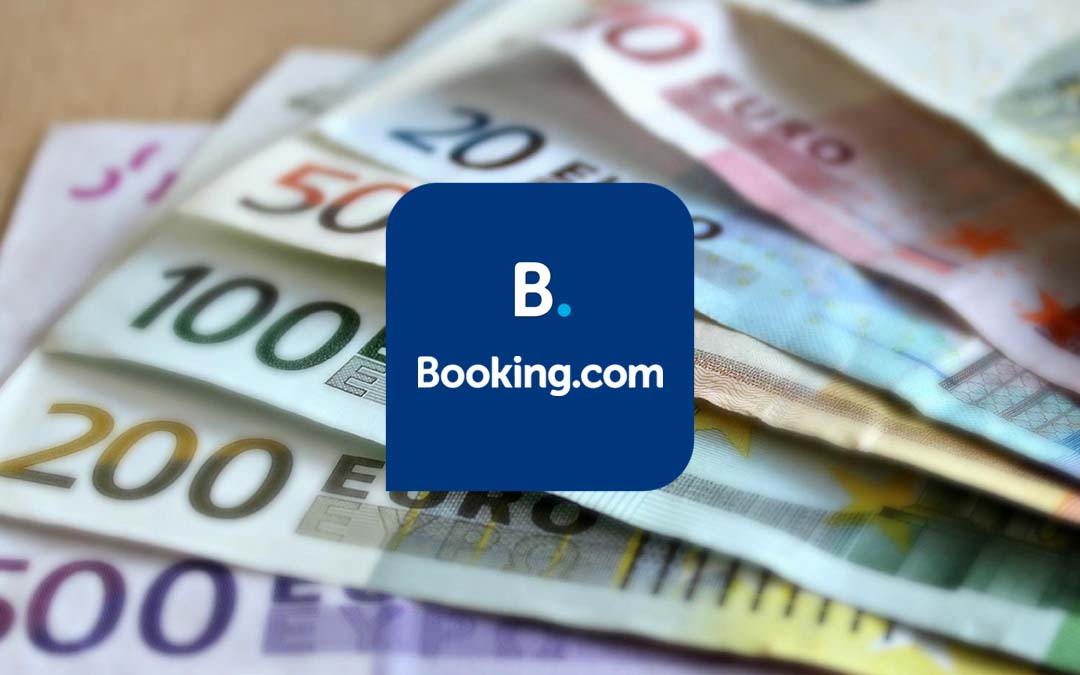

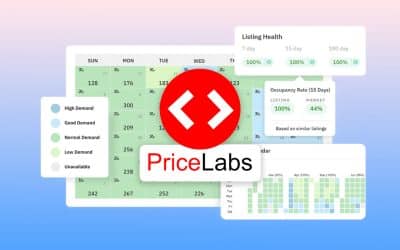
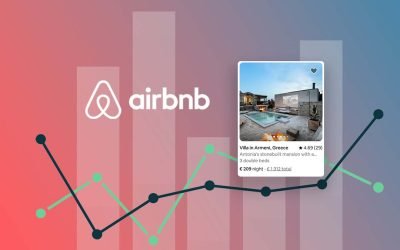


Good morning
To use a platform like Your.Rentals to link to any of the biggest websites I would like wanted to advertise
However, I would like to mention to you how you work and the commission rate of your office make a booking from any site so that I always know how much I will earn.
Please answer my questions to make the listing I at Your.Rentals.
Thank you very much Thank you very much and it will be my pleasure to work together.
Vangelis Kostasos
Hi Vangelis
Thanks for getting in touch!
On our pricing page you’ll find a calculator which shows you exactly how much you’ll earn from every booking, so there are no hidden costs 🙂
One of our account managers will be in touch to help answer any questions you have about Your.Rentals and to discuss if we are the right solution for you.
Thanks again, and I hope we will be working together soon!
Regard
Dan
Your.Rentals
Do you have complete control of bookings made thro yourselves or do I have a say i.e be able to offer them an alternative apartment if mine is not available for their dates?
Are all enquiries made to you totally controlled & managed by you, so that I have no say? Can I not propose an alternative apartment if my place is unavailable for the dates they require?
Hi!👋 Thanks for getting in touch!
When you receive an enquiry or a request booking through Your.Rentals we’ll let you know the details, and if you find that you can’t accept it we will of course help you to arrange an alternative if possible 🙂
Better yet, I’d recommend moving to an Instant Booking model since that leads to greater booking conversion (we explain why here). That does mean though that your property calendars have to be 100% accurate – more on that here – but if you need a hand setting up your listings so that all dates are displayed correctly let me know and I’ll put you in touch with one of our account management team.
I hope that answers your question – if you need anything else feel free to get in touch!
Have a great day!
Dan
Your.Rentals
We are in the process of getting our home updated to do a Guest House/B&B. Is there someone who could ring me to advise on how to advertise our rooms on ******60640. Thanks. Steve Hicks
Hi Stephen we will get in touch asap.
Thanks
very well stated And you cant find out Booking fees until you list. Ugh